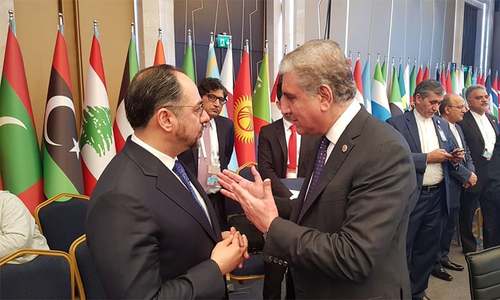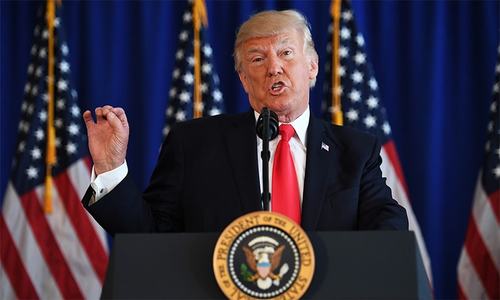FOREIGN ministers of the Organisation of Islamic Cooperation (OIC) met in Istanbul after the “savage terrorist attack which took the lives of 51 Muslim worshippers in Christchurch”. Notably, while the New Zealand prime minister unequivocally condemned this act as terrorism, many Western capitals refrained from branding it as such. India’s reaction did not mention either Muslims or mosques.
Since the terrorist attacks of 9/11 against the US, the ‘war on terrorism’ has been largely a war against ‘Islamic terrorism’
The UN Security Council outlawed Al Qaeda and all organisations ‘associated’ with it. A Security Council committee formed to ‘monitor’ counter-terrorist actions, established a list of ‘terrorist’ groups and individuals who are exclusively ‘Islamic’. Apart from Al Qaeda and its associates, such as the Islamic Movement of Uzbekistan and the East Turkmenistan Islamic Movement, the pro-Kashmiri Jaish-e-Mohammed was ‘listed’ after the 2007 assassination attempt against president Musharraf and the Lashkar-e-Taiba after the 2008 Mumbai attack.
Under the cover of countering terrorism, state suppression of the rights of Muslims has intensified.
Under Security Council resolutions, extensive obligations were imposed on states to prevent financing and support for the listed ‘terrorist’ organisations and to cooperate against them.
In the US and most Western countries, any act of violence perpetrated by a Muslim, whether or not associated with a terrorist organisation, is described as an act of terrorism. Moreover, not only violence, but even involvement in raising finance for a ‘terrorist’ organisation or a violent action, or an expression of support for a terrorist organisation or a violent action, is diligently prosecuted, even if the act is the consequence of a ‘sting’ operation. Similar crimes committed by non-Muslims rarely evoke the terrorist label.
Pakistan and some OIC countries made early attempts to counter such discrimination. At the 2005 UN summit, they secured a declaration which condemned “terrorism in all its forms and manifestations, committed by whomsoever, wherever and for whatever purposes...”. The summit furthermore called for the adoption of a ‘Comprehensive Convention on Terrorism’.
Encouraging progress was made in the UN General Assembly’s Legal Committee in 2006/07 on drafting the convention. Its approval was, however, prevented by the refusal of some major powers and India to address ‘state terrorism’ and the root causes of terrorism.
The Trump administration has given up all pretence of objectivity and declared ‘war’ on ‘radical Islamic terrorism’. This anti-Muslim focus has been eagerly embraced by India and several other states which face internal Muslim insurgencies.
The global counterterrorism campaign has had mixed success. Al Qaeda is greatly diminished and the militant Islamic State group has been territorially defeated. But insurgent Muslim groups have sprouted and spread across the Middle East, North Africa and beyond.
Unfortunately, under the cover of countering terrorism, the state suppression of the legitimate rights and freedom struggles of Muslim peoples, as in occupied Kashmir and Palestine, has intensified. Some Muslim communities, like the Rohingya, have suffered genocide. Some, like the Kashmiris, face the prospect of a Pakistan-India war or genocide if the Hindu fundamentalists in India persist in their plans to colonise them. Meanwhile, the continued occupation and oppression of the Palestinian people, and even the Israeli usurpation of holy Jerusalem, no longer moves the world’s conscience.
Crass discrimination against the Muslims has been made ‘acceptable’. Muslim refugees and migrants are turned away from Western borders in violation of international law and humanitarian norms. The defamation of Islam and other manifestations of Islamophobia have become socially and politically acceptable in the West and elsewhere. This has generated widespread hate against Muslims that was so vividly and tragically manifested in the slaughter of the 51 Muslims in the Christchurch mosques.
This global denigration and demonisation of the Muslim faith can be halted and reversed only if the OIC countries act with determination, unity and clarity.
Reviving the call for a ‘Comprehensive Convention on Terrorism’ may be a good place to start.
From the perspective of OIC countries, the convention should firstly agree on a legal definition of terrorism. One formulation could be ‘the use of force and violence against persons or property to coerce a government, the civilian population, or any segment thereof, committed by whomsoever, wherever and for whatever social or political purposes, except in the exercise, in accordance with the principles of the UN Charter, of the legitimate right of self-defence and self-determination or resistance to foreign occupation’.
This definition should not exclude ‘state terrorism’. If some major powers seek to exclude ‘armed forces’ from the purview of the convention, ways would have to be found to limit this exclusion, for instance, by defining the conditions under which such an exclusion is possible and by affirming that this does not in any way compromise or constrain the legitimate right of peoples to struggle for their right to self-determination and against foreign occupation.
The convention, or at least its accompanying resolutions, should explicitly condemn as terrorism the violence perpetrated or propagated by white supremacist, neo-Nazi and fascist groups in Europe, the US and other countries. Their actions should be prohibited equally with those of the Islamist groups listed as ‘terrorists’ and equal constraints should be placed on the propagation of their Islamophobic, anti-Semitic, racist and violent ideologies.
Similarly, the Rashtriya Swayamsevak Sangh and other violent extremist Hindu organisations in India deserve to be classified as terrorists. Their ideology is one of religious supremacy, hate and violence. Starting from the assassination of Gandhi, the list of their crimes is long and manifest: the Gujarat massacre of Muslims; the Samjhauta Express slaughter of Pakistanis; the ongoing violence against the Kashmiris; the cow-lynching of poor Indian Muslims; the suppression of Dalits, Adivasis, Naxalites, and other disadvantaged communities; the murder of journalists and political opponents.
A UN Security Council or General Assembly Committee should be established to list and monitor these additional ‘terrorist organisations’.
Pakistan is well placed to assume the lead in evolving a common and unified OIC strategy and collectively convincing the major powers that failure to adopt an equitable approach on terrorism will intensify crimes against Muslims, exacerbate the terrorist threats in and from the Islamic world and beyond and precipitate in dangerous regional and global conflicts.
The writer is a former Pakistan ambassador to the UN.
Published in Dawn, March 31st, 2019














































